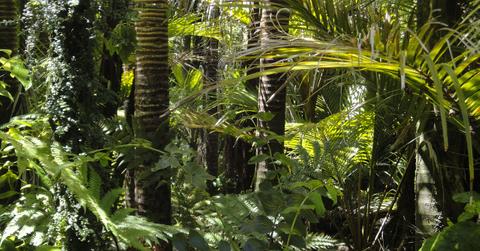73 Million Trees Are Being Planted To Resurrect Brazil's Tropical Forests
While there's been tremendous efforts in reforestation, it hasn't been able to keep up with man-made destruction. A new process that's being used in the Amazon forests in Brazil could provide quick recovery with little labor.
Updated May 21 2019, 6:58 a.m. ET
For the past 40 years, 20 percent of rainforests in the Amazon have been chopped down. This scary number could double in the near future, meaning that we need to do something on a large scale to replant these forests, else risk losing them entirely. Luckily, a new process in Brazil that doesn’t require much labor, nor many natural resources, could give us tens of millions of trees. That's right: Tens of millions.
How will this happen? First, some background. The “muvuca” process was created just a few years ago, and the Portuguese phrase translates to “unruly crowd,” or a crowded group in a small place. A wide variety of seeds from over 200 different species will be supplied by the Xingu Seed Network. Many volunteers collected these seeds from around the world and they’ll be dumped onto deforested land that has been damaged and burned, in order to replenish growth.
It’ll be up to the Amazon’s nature to determine the next step, of course. Up to 90 percent of the seeds will collect enough nutrients to grow into trees. This provides a better opportunity for plants and trees to flourish when compared to raising saplings. Not only do they require more labor, but many wouldn’t be able to thrive in the harsher climate.
“With plant-by-plant reforestation techniques, you get a typical density of about 160 plants per hectare,” Rodrigo Medeiros, Vice President of Conservation International, said to Fast Company. “With muvuca, the initial outcome is 2,500 species per hectare. And after 10 years, you can reach 5,000 trees per hectare. It’s much more diverse, much more dense, and less expensive than traditional techniques.”
Conservation International and Monsanto, an agricultural group, worked with local farmers in Brazil to test the method out. Not only did it boost the economy, but it lowers global warming and increases awareness on deforestation. Should we eliminate deforestation altogether, 37 percent of yearly carbon emissions could be absorbed by the trees left up.
Luckily, deforestation has gone down over recent years. Back in 2015, Brazil pledged to restore roughly 30 acres of deforested Amazon and to increase renewable energy usage by 2030. In that time frame, they also wanted hydropower to factor in up to one-third of their total energy generation. This new project will open up 2,000 temporary jobs for locals and families can gain up to $700 per hectare (equivalent to 2.47 acres).
Conservation International believes that approximately 73 million trees will be sprouting up after their efforts are over in the Amazon. They’re hoping to restore over 70,000 acres and to clean up the mess that deforestation has left behind.
